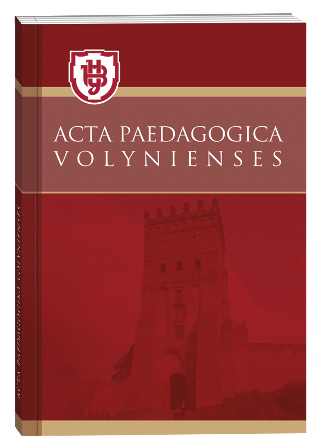ФОРМУВАННЯ ЕКОЛОГІЧНОЇ КОМПЕТЕНТНОСТІ МОЛОДШИХ ШКОЛЯРІВ: ДІЯЛЬНІСНИЙ ПІДХІД
DOI:
https://doi.org/10.32782/apv/2024.1.7Ключові слова:
екологічна компетентність, молодший школяр, діяльнісний підхід, шкільна екологічна освіта.Анотація
У статті обґрунтовано актуальність проблеми розвитку екологічної компетентності молодших школярів у контексті соціальних і освітніх викликів в Україні і світі з опорою на нормативні документи міжнародного й вітчизняного рівнів, узагальнення даних компаративних досліджень. Визначено концептуальні підходи до змісту вихідної дослідницької категорії «екологічна освіта» у варіативних поглядах на її складники, технологічні характеристики як компетентнісного результату шкільної екологічної освіти у діяльнісному вимірі; конкретизовано зміст і педагогічну сутність формування екологічної компетентності молодших школярів на уроках і в позаурочній діяльності, що полягає у цілеспрямованому формуванні системи екологічних знань про взаємозв'язки у природі, про вплив людської діяльності на природні процеси; вихованні екологічно доцільних норм поведінки, розвитку навичок раціонального природокористування; формуванні емоційно-ціннісного ставлення до природи як універсальної, унікальної цінності, що має право на існування незалежно від користі для людини. Розроблено діагностичну програму дослідження стану екологічної освіти в початкових класах, на основі запитів вчителів щодо ефективності змін в змістовому і процесуальному забезпеченні. Встановлено, що саме в школі І ступеня діяльнісний підхід є визначальним в екологічній освіті, оскільки через діяльність дитина пізнає навколишній світ і набуває досвіду природоохоронної поведінки. На основі одержаних даних узагальнено вимоги до результативності екологічної освіти, передбачені в Національній рамці кваліфікації України, Державному стандарті початкової освіти, Типових освітніх програмах за циклами навчання. Зроблено висновки щодо ефективності окремих методів екологічної освіти (виконання проєктів; участь у волонтерських заходах; розігрування ситуацій морального вибору, пов’язаних з безпечною поведінкою в природі; подорожі-спостереження; розв’язання природничих задач). Для підвищення результативності екологічної освіти вважається за доцільне збільшити кількість інтерактивних форм екологічного навчання; розробити наскрізну взаємоузгоджену програму формування екологічної компетентності на всіх ступенях шкільної освіти; створити систему комплексного оцінювання екологічних компетентностей учнів.
Посилання
Байбара Т. М. Поточна перевірка навчальних досягнень учнів з природознавчої складової курсу «Я у світі». Контроль та оцінювання навчальних досягнень учнів 3-4 класів: посібник/Савченко та ін. Київ, 2012. С. 218.
Бібік Н., Павлова Т. Організація навчання в 4 класі інтегрованого курсу «Я досліджую світ». Організація освітнього процесу в початковій школі: Методичні рекомендації. Орієнтовні календарно-тематичні плани. 4 клас. Київ, 2021. С. 67. URL: https://undip.org.ua/wp-content/uploads/2022/12/Organization_of_educational_proces_PRINT_1.pdf
Біла книга національної освіти України / За заг. ред. акад. В. Г. Кременя. Київ, 2010. С. 49.
Етика відносин з природою: навчально-методичний посібник /О. Пруцакова, Н. Пустовіт, А. Логінова, Г. Тарасюк. Кропивницький, 2019. С.13.
Засєкіна Т. М. Інтеграція в шкільній природничій освіті: теорія і практика: монографія. Київ, 2020. С. 184. URL: https://lib.iitta.gov.ua/729967/3/monografiya_integrachia.pdf
Локшина О.І. Зміст шкільної освіти в країнах Європейського Союзу: теорія і практика (друга половина ХХ – початок ХХІ ст.): монографія. Київ, 2009. С. 182. URL: https://lib.iitta.gov.ua/id/eprint/5435
Онопрієнко О.В. Інструментарій оцінювання результатів компетентнісно орієнтованого навчання молодших школярів: методичний посібник. Київ, 2020.С. 9. URL: https://lib.iitta.gov.ua/id/eprint/722959
Пометун О.І., Сущенко І.М., Онопрієнко О.В., Цимбалару А.Д. Моя щаслива планета: Уроки для стійкого розвитку: Метод. посібник для вчителів 3 – 4 класів загальноосвітніх навчальних закладів. Київ, 2011. 112 с. URL: https://www.ippo.if.ua/images/stories/Rizne/manual_my_happy_planet.pdf
Про внесення змін до Державного стандарту початкової освіти: Закон України (2019 р.). URL: https://zakon.rada.gov.ua/laws/show/688-2019-%D0%BF#Text
Про затвердження Національної рамки кваліфікацій: Закон України (2011 р.). URL: https://zakon.rada.gov.ua/laws/show/1341-2011-%D0%BF#Text
Про освіту: Закон України (2017 р.). URL: https://zakon.rada.gov.ua/laws/show/2145-19#Text
Про концепцію екологічної освіти в Україні. Закон України (2001 р.) URL: https://zakon.rada.gov.ua/rada/show/v6-19290-01#Text
Типова освітня програма для закладів загальної середньої освіти, розроблена під керівництвом О.Я. Савченко (3-4 класи) (2018 р.). URL: https://undip.org.ua/library/typova-osvitnia-prohrama-dlia-zakladiv-zahalnoi-serednoiosvity-rozroblena-pid-kerivnytstvom-o-ya-savchenko-3-4-klasy/
Learn for our planet: a global review of how environmental issues are integrated in education (2021) UNESCO, 48 p. URL: https://unesdoc.unesco.org/ark:/48223/pf0000377362 (in English)
Tani S. Multiple meanings but limited visions: the concept of the environment in environmental education. Sustainable development through education. 2006. № 268. P. 3-13 URL: https://researchportal.helsinki.fi/en/publications/multiple-meanings-but-limited-visions-the-concept-of-the-environm (in English)







